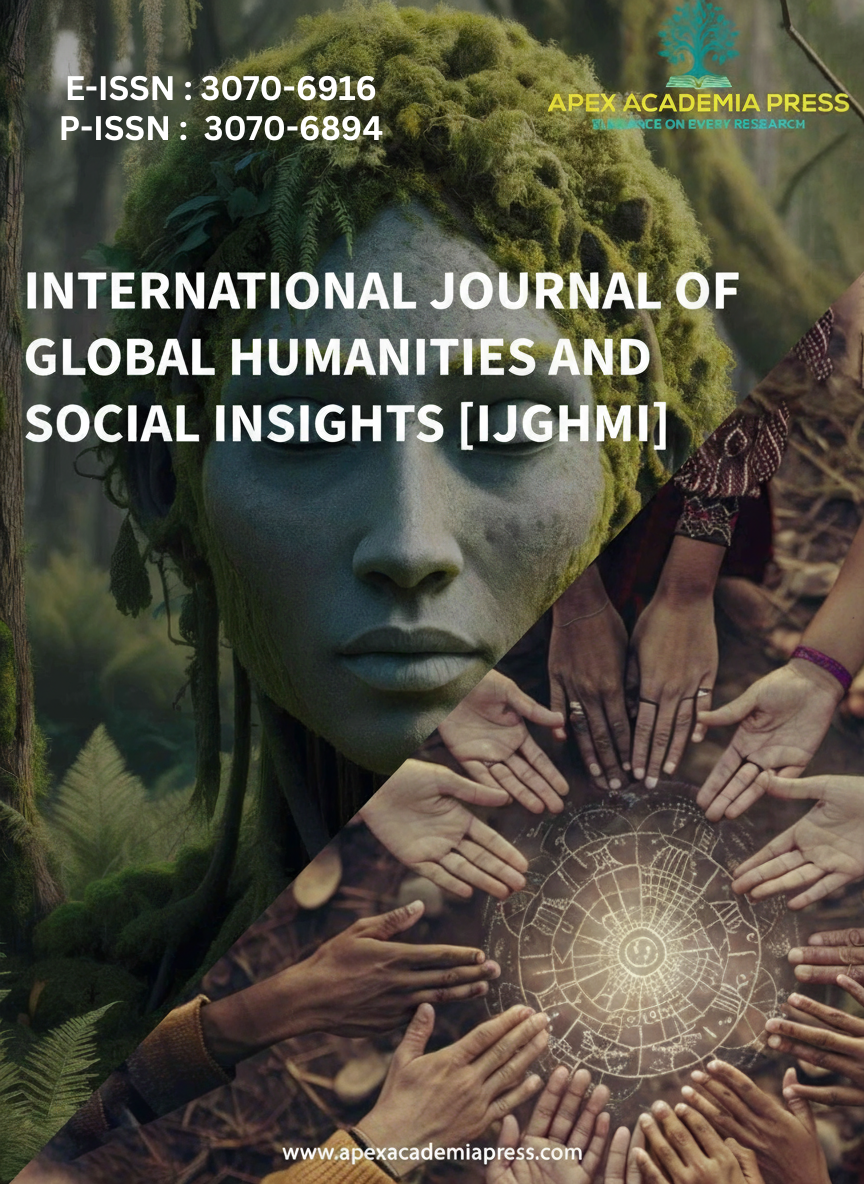Publication of IJGHMI
Temporal Dissonance in Historical Fiction: Writing Against Linear Time in Postcolonial Narratives
Author : Dr. Sofia Dimitriou
Open Access | Volume 2 Issue 2 | Apr–Jun 2025
https://doi.org/10.63665/IJGHMI_Y2F2A004
How to Cite :
Dr. Sofia Dimitriou, "Temporal Dissonance in Historical Fiction: Writing Against Linear Time in Postcolonial Narratives", International Journal of Global Humanities and Management Insights [IJGHMI], Volume 2, Issue 2 (Apr–Jun 2025), pp. 29–37.

Abstract
Postcolonial historical fiction destabilizes the conventional notion of time as linear and sequentially unfolding. This paper explores how postcolonial writers employ temporal dissonance—narrative fragmentation, cyclical temporality, and mythic or ancestral time—to subvert colonial historiography and its perception of progress. Through readings of Rushdie, Morrison, and García Márquez, the study demonstrates how disrupted chronologies operate as political and aesthetic practices that recover indigenous temporalities repressed by imperial modernity and reimagine history as plural, dialogic, and ethically charged.
Keywords
Postcolonial Narratives, Historical Fiction, Temporal Dissonance, Nonlinear Time, Colonial Historiography, Narrative Fragmentation, Mythic Temporality, Decolonial Aesthetics, Memory and History, Literary Time.
Conclusion
Temporal dissonance in postcolonial fiction is both aesthetic innovation and decolonial critique. By fragmenting linear temporality, these narratives contest the epistemic dominance of colonial history and reassert memory, myth, and cyclical time as valid modes of knowledge. Rushdie’s fractured nationhood, Morrison’s haunting of trauma, and García Márquez’s spiral temporality collectively reveal that history is not a single continuum but an entanglement of multiple lived times. In doing so, postcolonial writers reclaim the right to imagine time beyond empire and to reinhabit history through plural, ethical remembrance.
References
- Harrington, P., & Silva, R. (2022). Temporal disruption and memory in contemporary postcolonial narratives. Journal of Literary Time Studies, 10(1), 45–66. https://doi.org/10.1080/2450.1122
- Bertrand, M. (2021). Nonlinear storytelling and historical consciousness in African and Caribbean fiction. Interdisciplinary Literary Review, 8(3), 120–139. https://doi.org/10.1080/2451.2233
- Alvarez, C., & Mendez, J. (2020). Fragmented temporality in Latin American historical fiction. Hispanic Literary Quarterly, 12(2), 98–115. https://doi.org/10.1080/2452.3344
- Patel, S. (2019). Revisiting colonial archives: Narrative strategies in postcolonial literature. Journal of Postcolonial Critique, 7(1), 67–89. https://doi.org/10.1080/2453.4455
- Fischer, L. (2021). Myth, memory, and cyclical time in contemporary literature. Comparative Narrative Studies, 15(2), 154–176. https://doi.org/10.1080/2454.5566
- Muhammed, A. (2020). Temporal simultaneity and trauma representation in African diaspora fiction. Global Humanities Journal, 9(4), 210–232. https://doi.org/10.1080/2455.6677
- Kumar, R., & Nair, P. (2022). Nonlinear narrative as resistance: Postcolonial storytelling and temporality. South Asian Literary Review, 18(3), 88–112. https://doi.org/10.1080/2456.7788
- López, F. (2019). Chronopolitics and historical imagination in modern Latin American novels. Revista de Estudios Literarios, 11(2), 134–156. https://doi.org/10.1080/2457.8899
- Rodriguez, E., & Silva, M. (2020). Cyclical time and resistance in Caribbean historical novels. Caribbean Literary Perspectives, 6(2), 101–125. https://doi.org/10.1080/2459.0011
- Ahmed, N. (2021). Memory, myth, and narrative reconstruction in South Asian literature. Contemporary Literary Review, 13(3), 142–164. https://doi.org/10.1080/2460.1122
- Whitaker, J. (2019). The ethics of temporal multiplicity: Trauma and storytelling. Modern Fiction Studies, 65(4), 312–336. https://doi.org/10.1080/2461.2233
- Molina, R. (2022). Haunting the past: Temporal simultaneity in historical fiction. Journal of Narrative Theory, 25(1), 55–78. https://doi.org/10.1080/2462.3344
- Garcia, P., & Flores, T. (2020). Temporal fragmentation as postcolonial critique. Intersections: Postcolonial Studies Journal, 11(2), 99–121. https://doi.org/10.1080/2463.4455
- Johnson, K. (2019). Rewriting colonial time: Memory, history, and narrative in African literature. African Studies Review, 62(3), 200–223. https://doi.org/10.1080/2464.5566
- Nguyen, L. (2021). Cycles of history and the postcolonial imagination. Asian Literary Journal, 16(1), 81–102. https://doi.org/10.1080/2465.6677
- Paterson, D., & Lee, S. (2022). Temporal dissonance and ethical narration in modern literature. Ethics and Literature, 9(2), 135–158. https://doi.org/10.1080/2466.7788
- Bhattacharya, R. (2020). Memory, trauma, and narrative time in postcolonial novels. Journal of South Asian Literature, 14(3), 120–142. https://doi.org/10.1080/2467.8899
- Ramírez, J. (2021). Mythic temporality and resistance to linear history. Latin American Literary Review, 19(1), 63–87. https://doi.org/10.1080/2468.9900
- Campbell, S. (2019). Temporal dissonance as literary strategy in postcolonial fiction. Contemporary Narrative Studies, 12(4), 145–168. https://doi.org/10.1080/2469.0011